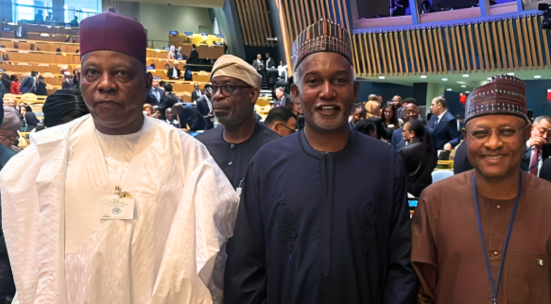VICE President Kashim Shettima has pitched Nigeria’s $200 billion energy transition opportunity to global investors, urging stronger partnerships to harness the multi-billion-dollar economic reforms being implemented under President Bola Tinubu’s Renewed Hope Agenda.
Speaking at a Roundtable hosted by the Business Council for International Understanding (BCIU) in New York, on the margins of the 80th United Nations General Assembly (UNGA), Shettima said Nigeria is strategically positioned as the natural hub for the African Continental Free Trade Area (AfCFTA) $3.4 trillion market.
“With 210 trillion cubic feet of gas reserves and some of Africa’s highest solar irradiation levels, Nigeria offers a $200 billion energy transition opportunity,” the Vice President told investors.
He explained that fiscal incentives and VAT waivers are already de-risking investments in traditional and renewable power assets, from gas-fired plants to off-grid solar and clean hydrogen pilots.
Highlighting the country’s broader transformation, Shettima pointed to Nigeria’s bold economic reset since mid-2023, including the unification of exchange rates, removal of decades-old fuel subsidies, modernization of tax and customs regimes, and an overhaul of trade and investment policies.
“The results are visible: GDP growth is accelerating, external reserves are strengthening, inflation is moderating, and investor commitments are rebounding,” he said.
The Vice President also noted that international confidence is reflected in sovereign rating upgrades, with Fitch lifting Nigeria to B with a stable outlook and Moody’s raising its issuer rating to B3 with a stable outlook in April.
“This positions Nigeria as the natural hub for the AfCFTA’s 3.4 trillion-dollar market,” he stressed.
Showcasing Nigeria’s comparative advantages, Shettima underscored its status as Africa’s largest economy and consumer market of 236 million people, projected to reach 320 million by 2040, with a youthful median age of 17.
“Beyond demographics, we have 44 natural resources, 210 trillion cubic feet of gas, five tech unicorns, Africa’s largest oil reserves, and one of the world’s deepest talent pools. Naija no dey carry last,” he declared.
He highlighted reforms in the investment climate, including a four-pillar incentives framework with simplified taxes, export-linked rebates, five percent annual tax credits on capital expenditure, and investor protections through modernized bilateral investment treaties.
Nigeria’s Special Economic Zones, he added, now host over $5 billion in installed industrial capacity, while Agro-Industrial Zones are cutting post-harvest losses by up to 40 percent and linking farmers directly to export hubs.
Beyond energy, Shettima spotlighted opportunities across mining, digital innovation, the creative industries, and healthcare, noting that Nigeria’s entertainment sector is projected to grow from $15 billion to $100 billion by 2030, while tech and broadband expansion are positioning the country as Africa’s fastest-scaling digital hub.
Earlier, Minister of Industry, Trade and Investment, Dr. Olajumoke Oduwole, said reforms under President Tinubu have already attracted over $50 billion in new investment interests across key sectors.
Vice President Shettima, who represented President Tinubu at UNGA80, was joined at the BCIU Roundtable by top government officials, including Kaduna State Governor Uba Sani, Solid Minerals Minister Dele Alake and Arts and Culture Minister Hannatu Musa Musawa.







